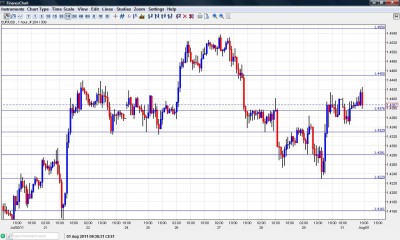Euro dollar starts the week with some hesitant range trading. The news about a deal to raise the debt ceiling in the US helps the dollar, but was quite expected. Will the US be downgraded? In Europe, peripheral yields are easing, but this may be quite temporary, as Spain awaits a downgrade.
Here’s a quick update on technicals, fundamentals and what’s going on in the markets.
EUR/USD Technicals
- Asian session: An active session saw the pair flirt around the 1.4375 line, move higher, but then retreat.
- Current range 1.4375 to 1.4450.
- Further levels in both directions: Below 1.4375, 1.4325, 1.4282, 1.4230, 1.4160, 1.41, 1.4070.
- Above: 1.4450, 1.4550, 1.4650, 1.47, 1.4775, 1.4882, 1.4940.
- 1.4325 is only weak support, with 1.4282 being a more important line on the downside.
- 1.4450 is more significant on the upside
Euro/Dollar trading with mixed feelings – click on the graph to enlarge.
EUR/USD Fundamentals
- 8:00 Final Manufacturing PMI. Exp. 50.4 points. Actual 50.4.
- 9:00 European Unemployment Rate. Exp. 9.9%.
- 14:00 US ISM Manufacturing PMI. Exp. 55 points. An important hint towards the Non-Farm Payrolls.
- 14:00 US Construction Spending. Exp. -0.1%.
* All times are GMT.
For more events later in the week, see the Euro to dollar forecast
EUR/USD Sentiment
- Debt Hike Deal in the US, Downgrade awaited: Intense negotiations towards the official “drop dead date” of August 2nd came to a conclusion in the eleventh hour and a deal was announced later on Sunday. The details aren’t clear yet, but it will likely be voted on later in the day. Things can still go wrong in the last moment, but expectations are currently high. The limited compromise will likely send some of the rating agencies to downgrade the credit rating of the US, although we might have a split rating: S&P can lower the rating to AA, while Fitch and Moody’s might leave it on AAA. Some tough love for the US.
- Italian woes: Despite all the agreements, doubt about the results is beginning to appear. The EFSF (bailout fund) will probably have the powers to intervene in the bond markets only towards the end of the year. This is a very long time. German finance minister Wolfgang Schaeuble said he is “against a carte blanche for the euro zone’s rescue fund to purchase bonds on the secondary market”. This mechanism is the key for preventing further bailouts. Italy raised money in the markets, but had to settle for higher yields and a sum that was smaller than expected. It isn’t only the price of bonds, but this already affects new funding and may become unsustainable . There are worrying signs in Europe.
- The US hardly grows: Data published on Friday was worse than expected. Not only did the US grow less than expected in Q2 2011, but Q1 was unexpectedly revised to a growth rate of only 0.4%. This triggered worries that Ben Bernanke could hit the printing presses once again, with QE3, after ruling it out not so long ago.
- Spanish troubles: Spain is set for a downgrade very soon by Moody’s, as expected. While yields are now off 6%, there is high uncertainty. General elections were pushed forward by the government, and they are expected in November now. In the meantime, Deutsche Bank ditches Spain and other countries in the periphery.
- Slowdown in growth and in prices: It is not only peripheral countries that are struggling. Also Germany and France have reported a significant slowdown in activity, in both manufacturing and services sectors. Flash CPI estimates released on Friday have shown that headline inflation is easing to 2.5%. While this is above the ECB’s target, it is lower than expected, leaving room for a softer stance in the rate decision on Thursday.

